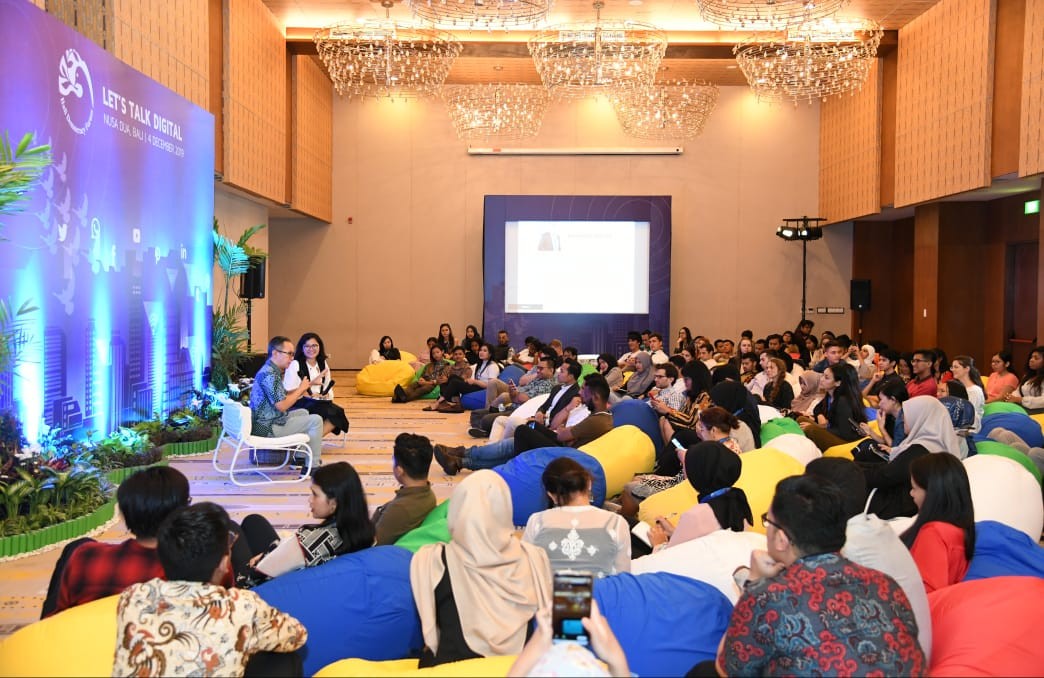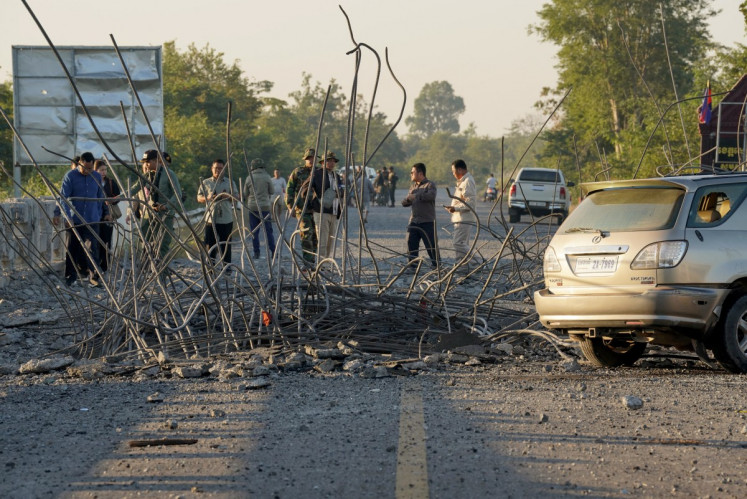Popular Reads
Top Results
Can't find what you're looking for?
View all search resultsPopular Reads
Top Results
Can't find what you're looking for?
View all search resultsFrom podcasts to papers, global youth find ways to uphold democracy
At the Bali Democracy Student Forum this year, young people are becoming clicktivists and joining rallies around the world as a form of self-expression, a new reality that they hope older generations will come to understand.
Change text size
Gift Premium Articles
to Anyone
 Around 113 students from around the world attended a discussion with Deputy Foreign Minister Mahendra Siregar on the evening of Wednesday, Dec. 5. The talks are part of the Bali Democracy Student Forum, an event geared toward the youth of the world hosted in conjunction with the 12th Bali Democracy Forum in Nusa Dua, Bali. (Courtesy of/Foreign Ministry)
Around 113 students from around the world attended a discussion with Deputy Foreign Minister Mahendra Siregar on the evening of Wednesday, Dec. 5. The talks are part of the Bali Democracy Student Forum, an event geared toward the youth of the world hosted in conjunction with the 12th Bali Democracy Forum in Nusa Dua, Bali. (Courtesy of/Foreign Ministry)
I
rish law student Colm Kelly-Ryan, 21, has had to fly in from Sweden, passing through the United Kingdom and Singapore on a 16,000-kilometer trip around the world, in order to take part in the 2019 Bali Democracy Student Forum.
Luckily, he found the journey to be a worthwhile experience.
As a graduate student focused on human rights law at Lund University, Kelly-Ryan was just one of 113 youngsters from 50 countries to participate in the international student forum, which is gaining traction as a training ground for future human rights and democracy activists.
Speaking to the delegates on Wednesday evening about “Democracy and Inclusivity”, the theme of this year’s forum, Foreign Minister Retno LP Marsudi insisted that the younger generation would have a big role in shaping democracy and communities, and that it would be impossible to talk about inclusivity without including them in discussions.
Kelly-Ryan said he was glad to know that Indonesia put forward inclusivity as a main theme and hoped the message might resonate with other countries.
The open dialogue highlighted differences in approach to activism between the younger and older generations, with Deputy Foreign Minister Mahendra Siregar noting how people nowadays had “abandoned the conventional way” of making their voices heard by shifting to virtual spaces.
“It is a challenge for everybody, not only for youngsters,” he told the students in Nusa Dua, Bali.
Mahendra also said, however, that online activism was more inclusive in a way because everyone had access to a means of communication, making it a better way to express concerns or champion a cause – and more effective than what regular politicians have done.
“It is more powerful [because] you can build your own constituencies,” he said.
Social activism has been on the rise in the digital era due to its easy access through social media. People anywhere can start voicing their opinions on issues of concern at any time, resulting in the rise of what many have dubbed "clicktivism". More and more youngsters are also turning to podcasting as a way to engage in a public forum on issues that matter to them.
Meanwhile, observers say Indonesia is only beginning to make use of social media as a tool for diplomacy, as many leaders around the world try to harness its power for national interests.
Kelly-Ryan, who runs his own podcast, said he understood the concerns of people from the older generation but believed it was more important to convey that the youth should be able to express themselves in both modern and conventional ways.
“Online activism is something that we should welcome in a democratic society [...] Young people can speak their mind freely on the internet and use the platform for good,” he told The Jakarta Post late Wednesday.
Taking his own work as an example, Kelly-Ryan said he was actively fostering dialogue within his own community through podcasting, by ensuring every speaker featured was given a platform to challenge the views of others.
“In our podcasts, they could agree or disagree [with the views of the host]. Listeners are the ultimate judges to the ideas being put forward.”
Meanwhile, 20 year-old Pradana Satya prefers to convey his ideas and opinions through the medium of academic papers, although he also believed people could no longer use “old school ways” of self-expression all the time. “We need to follow the latest developments,” said the third-year law student from Indonesia Islamic University (UII) in Yogyakarta.
“Nowadays, the academic world provides [great platforms] like international conferences, the output from which can be published in journals that we can then propose to decision makers.”
Pradana himself had submitted a paper about the 2019 general election in Indonesia to a conference hosted by Thammasat University in Thailand.
The world in 2019 has seen online activism snowball, with the #MeToo movement of speaking up against sexual harassment spreading from the United States to places as far-flung as Ethiopia, South Korea and Palestine.
Additionally, millions of people including the global youth have taken to the streets to protest and promote various causes, whether it be school strikes for the climate or rallies against gun violence.
From the prodemocracy rallies in Hong Kong to the Yellow Vests in France, from a revival of Indonesia’s student movement to riots across much of South and Central America, many people of the younger generation are getting involved in various forms of activism.
This year’s Bali Democracy Forum, which has served as a platform for governments to freely speak on issues pertaining to democracy, is being hosted against the backdrop of controversial statements suggesting the need to roll back Indonesian democracy.
Home Minister Tito Karnavian, for example, suggested that the government was thinking of abolishing direct public participation in electing local leaders, arguing that the process was too costly and still led to corruption.
Observers have noted that Indonesia’s democracy might be at its lowest point in almost 20 years. Freedom House and the Economist’s Democracy Index suggested that Indonesian democracy was “above the minimum threshold of electoral democracy, but well below the democratic quality it had in the mid to late 2000s.” (tjs)









